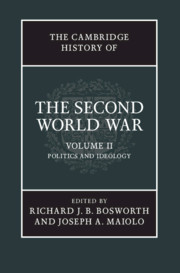Book contents
- The Cambridge History of The Second World War
- The Cambridge History of The Second World War
- The Cambridge History of the Second World War
- Copyright page
- Contents
- Contents
- Maps
- Contributors to Volume II
- Maps
- Introduction to Volume II
- Part I Ideologies
- Part II Diplomacy and alliances
- Introduction to Part II
- 9 Europe
- 10 Asia-Pacific
- 11 The diplomacy of the Axis, 1940–1945
- 12 The diplomacy of the Grand Alliance
- 13 Spain
- 14 Sweden
- Part III Occupation, Collaboration, Resistance and Liberation
- Bibliographical essays
- Index
- Plate Section (PDF Only)
Introduction to Part II
from Part II - Diplomacy and alliances
Published online by Cambridge University Press: 05 June 2015
- The Cambridge History of The Second World War
- The Cambridge History of The Second World War
- The Cambridge History of the Second World War
- Copyright page
- Contents
- Contents
- Maps
- Contributors to Volume II
- Maps
- Introduction to Volume II
- Part I Ideologies
- Part II Diplomacy and alliances
- Introduction to Part II
- 9 Europe
- 10 Asia-Pacific
- 11 The diplomacy of the Axis, 1940–1945
- 12 The diplomacy of the Grand Alliance
- 13 Spain
- 14 Sweden
- Part III Occupation, Collaboration, Resistance and Liberation
- Bibliographical essays
- Index
- Plate Section (PDF Only)
Summary
- Type
- Chapter
- Information
- The Cambridge History of the Second World War , pp. 211 - 216Publisher: Cambridge University PressPrint publication year: 2015

